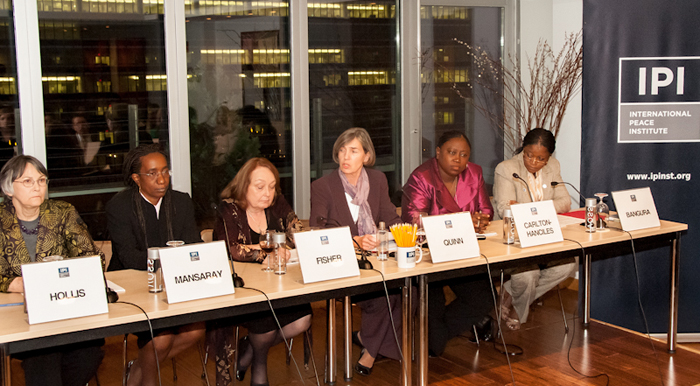
“Empowering women in post-conflict justice requires that women must be more than waitresses at the banquet of life,” said Brenda Hollis, Prosecutor of the Special Court for Sierra Leone, on October 10, 2012.
Ms. Hollis spoke at the inaugural event for IPI’s Women, Peace and Security Series that was co-hosted with UN Women and the United Nations Development Programme (UNDP). The event featured a panel of women leaders, including four principals from the Special Court for Sierra Leone, and Zainab Hawa Bangura, the Special Representative of the Secretary General on Sexual Violence in Conflict.
“The court’s jurisprudence on gender issues has been groundbreaking,” said Daniel Seymour, Deputy Director of the Program Division at UN Women. The court laid foundations in international law to prosecute forced marriage, sexual violence as terrorism, sexual slavery, and the recruitment and use of child soldiers, he explained.
The court also set precedents to institutionalize UN Security Council Resolution 1325, which was adopted on October 31, 2000. Resolution 1325 affirms the central role of women in resolving conflicts, and urges all actors to increase the participation of women in UN peace efforts.
Sheelagh Stewart, Director of the Governance and Rule of Law Group of UNDP, said, referencing the words of UN Women Executive Director Michelle Bachelet, “One of the most significant elements of 1325 is that it recognizes that war has a different impact on women than on men… Women are targeted for rape, targeted for forced marriage, and targeted for what they represent in society: honor, and the ability of men and the state to keep them safe.”
Ms. Stewart added, “This understanding about 1325 makes the jurisprudential achievements of the Sierra Leonean Special Court very important.”
Shireen Avis Fisher, Justice and President of the Special Court of Sierra Leone, shared with IPI’s audience the good news about the court’s impact she had delivered in earlier remarks to the Security Council. The news came from the results of an European Union-funded survey involving 3,000 participants in Sierra Leone and Liberia. When asked whether or not the court had delivered in its mandate, said Ms. Fisher, “80 percent of those surveyed said they believed that it had… [and] 91 percent of the people surveyed from Sierra Leone indicated that they believed that the Special Court had contributed to peace in Sierra Leone.”
“That was the highest accolade we could get,” she said.
Ms. Fisher also applauded the hybrid nature of the court. “We are two internationals and we are two Sierra Leoneans working together for the course of justice in Sierra Leone,” she said. Ms. Fisher attributed much of the court’s success to the fact that Sierra Leonean staff members were able to share on-the-ground expertise and innovate in ways that international outsiders could not. She added, however, that international assistance brought financial support and outside expertise to work with Sierra Leoneans in a synergistic way. “We are a living example of complementarity,” she said.
“We’ve also made our share of mistakes, which means that we are a guiding light for future courts under complementarity,” she added.
Claire Carlton-Hanciles, the Principal Defender for the Special Court for Sierra Leone, listed the broad array of charges that have been brought to the court, which include murder, crimes against humanity, the taking of hostages in connection with the abduction of UN peacekeepers in May of 2000, the murder of those peacekeepers, rape, extermination, acts of terror, enslavement, looting, sexual slavery, and the conscription of children into armed conflict.
Women were able to follow the court’s justice process from the inception of the court through an outreach program led by the court’s Registrar, Binta Mansaray. The program reached out to tens of thousands of women by designing programs to explain legal terminologies, and by sending court officials to communities and rural areas to engage in discussions, explained Ms. Mansaray.
Zainab Hawa Bangura, the Special Representative of the Secretary General on Sexual Violence in Conflict, shared her personal experience living through Sierra Leone’s civil war. She said, “Firstly, I know what it is like to be threatened by rebels who vow to rape and kill me, to silence me and stop me from working to restore peace and democracy in my country; secondly, I know what it feels like to look your child in the eye and tell him to run for his life because you may not make it out alive.”
“Finally,” she continued, “I know what it feels like to not only investigate, document, report, and work with victims to tell their stories, but to testify before the Special Court for Sierra Leone as an expert witness.”
Ms. Bangura said, “For me, the Special Court for Sierra Leone shows what can be done with strong political will, with the right expertise, with the right tools, and with national ownership.”
Mr. Seymour said, “It’s for all these reasons that the court has become a strong symbol of evolving international justice in relation to women’s rights. It’s also a powerful symbol, I should add, of women’s leadership in this area.”
The event was chaired by Maureen Quinn, IPI Senior Adviser.
![]() Download this text as a meeting brief
Download this text as a meeting brief
Watch event video:







